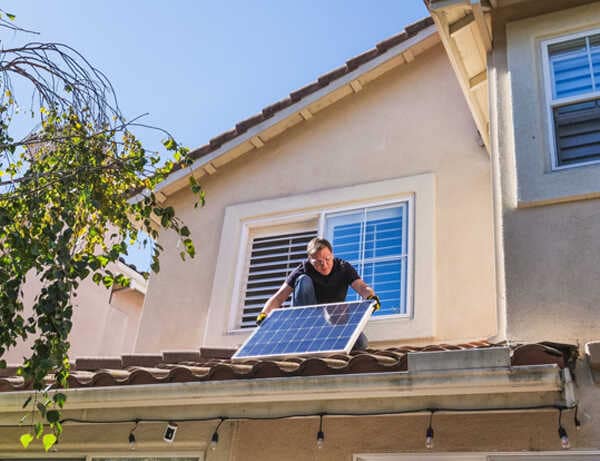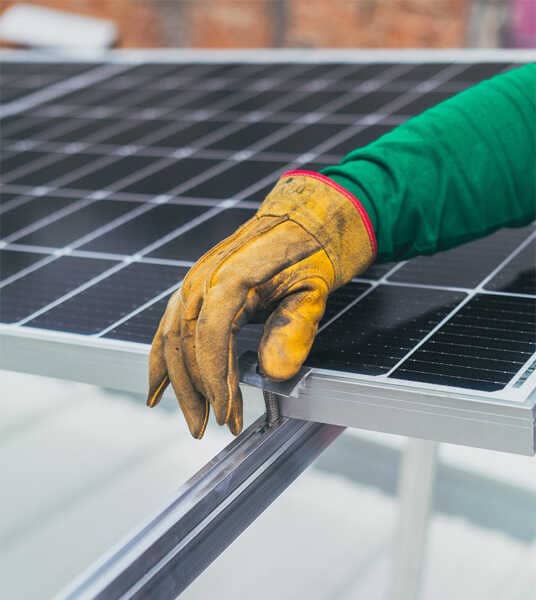Are Solar Panels Sustainable? Impacts of Solar Panels (And more)
As an Amazon Associate, Ecotero earns from qualifying purchases.
Solar panels are touted to be the best source of green energy since there’s nothing more sustainable than harnessing free energy from the sun.
However, the eco-friendliness and sustainability of solar panels is being questioned lately due to its manufacturing materials.
There is also the issue of whether or not solar panels are recyclable.
So today, we will discuss if solar panels are indeed the best way to access renewable green energy.
We will answer once and for all if solar panels are sustainable, should we switch to using solar energy, and more.
But before that, we need to understand how solar panel works.
How Does a Solar Panel Work?
Solar panels or Photovoltaic (PV) solar panels are sheets made with solar cells constructed with a positive and a negative layer.
For reference, they are just like batteries.
The collect photons from the sun rays and convert them to electrons.

As electrons flows through the solar cells of the solar panel, it will generate electricity.
How much Energy can you generate using solar panels?
Most residential solar panels today can produce between 250 and 400 watts each per hour. (see sources blow)
The more panels you put together, the more energy you can generate.
The weather is also a factor in energy generation.
Obviously, with less sunlight, less energy will be generated.
However, cold conditions though are not bad for your solar panels.
Like other appliances, solar panels work best in a cold environment.
That being said, solar panels produce more electricity in sunnier weather where there is an ample supply of sunlight.
What is a Solar Panel Made Of
While the solar panel’s capacity to generate electricity is very efficient, the manufacturing process of its parts does have quite a negative impact on the environment.
The six components of most Solar panels are:
- Aluminum Frame – provides a solid structure for the panels and protects the laminated housing of the cells. Solar panels are equipped with either silver or anodized black aluminum depending on the manufacturer.
- Tempered Glass – protects the cells from debris caused by weather changes. It is designed with enough strength to withstand inch-sized hailstones falling at 60 mph.
- Ethylene Vinyl Acetate – a transparent plastic layer used to encapsulate the cells and to hold them during the manufacturing process.
- Photovoltaic Cells – converts sunlight into Direct current(DC) electricity. This is the main component of Solar panels made with electronic-grade silicon. Cell performance varies depending on the silicon used which is either monocrystalline or polycrystalline silicon.
- Backsheet – the final layer and external skin made with polymers or plastics which protects the panels’ electrical insulation and stabilizes moisture, heat, and UV resistance.
- Junction Box -a small box that contains the connectors from the cells to an inverter. Solar panels’ backsheet and EVA are made with plastic which are barely recyclable.

The materials used to make these products are one of the reasons why some people are not sold that solar panels are sustainable, nor the best way to generate green energy.
And at this point you might be thinking:
Are Solar Panels Recyclable?
Yes, solar panel recycling facilities do exist.
Currently, three ways of recycling solar panels are practiced.
Different Ways to Recycle Solar Panels
1. Re-using Solar Panels
The simplest method to recycle solar panels is to reuse or recover the components decent enough to be part of the next reproduction of solar panels.
Complete reuse of solar panels could also be an option.
After refurbishing the old solar panel, it can be used again.
However, reusing parts has its issues.
Reusing parts will make a solar panel less efficient in generating energy and it will not reach the same 25-30 year lifespan.
Although, recyclable solar panels can be useful on devices that won’t need high electricity consumption.
It is a temporary answer for the overall sustainability of solar panels.
The question is: What happens after the recycled solar panels expires again?
Food for thought.
2. Mechanical Recycling of Solar Panels
Some solar panels contain toxic and critical materials like lead, cadmium, tin, tellurium, gallium, and indium.
One way of recycling this is through mechanical recycling.
This is the more physical aspect of recycling solar panels which involves heavy machinery.
Breaking down the solar panels will save its aluminum frame and solar cells.
Then the materials will be reused in manufacturing brand new solar panels.
3. Chemical Recycling of Solar Panels
While mechanical recycling is the physical aspect, chemical recycling is focused more on the molecular level of recycling solar panels.
Chemical recycling of solar panels uses extreme heat to evaporate EVA, leaving the silicon for further processing.
However, some people voiced concerns that evaporated EVAs are dangerous if it reaches the atmosphere.
These emissions will pollute the air we breathe.
We will never know when it will take a toll on us.
We can only hope that companies practicing these are following protocols that will not endanger human health and the environment.
So, are solar panels sustainable?
Are they eco-friendly and should we continue using them?
We listed the advantages and disadvantages of solar panels below to help you further understand (and weigh) the pros and cons.
Benefits of Solar Panel
1. Renewable Energy Source
As long as the Sun is shining, Solar panels will be capable to provide electricity.

Unlike fossil fuels, the Sun can provide a renewable source of energy with a very simple process of shining every day.
Their is no doubt that the energy industry will be more self-sufficient if more and more solar panels will be produced and installed.
2. Long-term Energy Assurance
The Sun has 5 billion years to go before it expires.
If our planet will survive until that, we are sure to have electricity supply from the Sun’s energy through solar panels.
Solar panels can last for 25 to 30 years which means a one-time purchase can already serve you for almost half a lifetime.
A day of Sun’s energy supply, if utilized properly, is enough for a year’s supply of electricity.
3. Non-Polluting, Clean Energy Source
Among other sources of energy, Sunlight is the most natural of all.
The way solar panels harness the heat from the sun to generate electricity doesn’t require processes that may damage or pollute our environment.
The solar panels are literally just sitting there under the sun converting sunlight into electricity.
Downsides of Solar Panels
1. Unsustainable Materials
Though solar panels have solved the problems caused by non-renewable energy resource, it is also guilty of unenvironmental impact.
Many of the materials used to manufacture solar panels are not sustainable.
For instance, solar panels uses plastic.
Then there’s the fact that other materials used in manufacturing solar panels are acquired through mining.
Mining has been responsible for polluting air, water, and land.
It can also cause deforestation, endangering the biodiversity of the area and compromising natural resources.

Worse, we’ve been manufacturing solar panels for decades now.
So if nothing will be done, we can expect tons of plastics, aluminum, and silicon wastes after they expires.
2. Chemically Treated Materials
Silicon, the material used for Photovoltaic cells, is mined in the form of Quartzite.
Quartzite will be combined with carbon which will turn it into metallurgical grade silicon. By chemical purification, it will turn into Polysilicon.
It will be doped with Boron and Phosphorous, producing either P-type or N-type silicon.
Melting it will produce Polycrystalline, Multicrystalline, and Monocrystalline cells in their respective melting process.
The problem will occur if these parts will not be managed or disposed of properly.
Not all companies can be trusted to supervise their wastes.
3. Recycling Solar Panels is Not Sustainable
Solar panel recycling facilities are greatly outnumbered by manufacturers.
And since a lot of solar panels are being produced since the year 2000 came, and they usually takes 25 to 30 years before it expires, we will probably be expecting a lot of waste from solar panels by 2025.
Furthermore, using recycled parts for new solar panels can’t sustain the production rate to meet market demands, so companies will still have to rely on mining for new materials.
Not to mention recycled solar panels are not efficient.
4. High Price Range
Solar panels are not cheap.

It does provide long-term stability on electric bills but not everyone can afford it.
Prices of solar panels were constantly decreasing over the years, however, due to scarcity of mined materials, its prices are slowly going up again.
How to make Solar Panels more Sustainable?
As the cleanest way to generate electricity, we can’t just disregard and put solar panels aside.
The problem is not in the energy generation process but on the manufacturing of this eco-friendly technology.
For the next years, solar panel manufacturers should’ve come up with answers to minimize their impact on the environment.
A good place to start would be to find means to recycle solar panel parts indefinitely.
Another would be to find more eco-friendly and sustainable materials in place of EVA and plastic when making solar panels.
For the chemically treated materials, they could come up with alternatives to further minimize their impact on the environment.
Moreover, standard regulations should be followed in the manufacturing, recycling, and reproduction of solar panels.
If as of the moment, we can’t eliminate wastes from old solar panels, manufacturers should find ways to manage them better.
But we would like to hear from you too.
In your opinion, are solar panels sustainable?
What do you think manufactures and companies need to do to make solar panels more sustainable?
Final Thoughts
Solar panels are not perfect in terms of eco-friendliness and sustainability.
Nevertheless, solar panels are one of the best ways to generate cleaner energy and reduce consumer’s energy consumption.
And while improvement in solar panel technology is in progress, we can do our part in keeping our planet safe by minimizing our impact in our own ways.
We can start by reducing energy consumption at home by being responsible in our electric usage.
Getting energy-efficient appliances (e.g. air fryers, refrigerators, etc.) can also help the cause.

